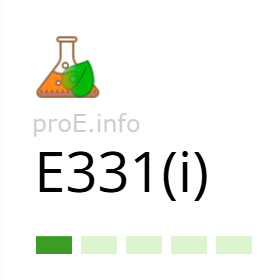
Other names for the additive (synonyms)
General Information
Food additive E331(i) is a monosodium salt of citric acid, more commonly known as monosodium citrate. It is one of the three forms of the additive E331, which also includes E331(ii) (disodium citrate) and E331(iii) (trisodium citrate).
E331i has the chemical formula NaC6H7O7 and is typically found as a white crystalline powder with no odor and a moderately acidic taste. Due to containing only one sodium atom, this form has the most pronounced acidity among all E331 subtypes.
Monosodium citrate is highly soluble in water and exhibits buffering properties — that is, the ability to stabilize the acidity of a product. This makes it a useful ingredient in formulations where pH control is important, such as in jellies, gelatin-based desserts, sports drinks, and medical products.
Unlike trisodium citrate, which often imparts a slightly salty aftertaste, E331i has a more distinct acidic profile, making it better suited for the production of sour-tasting beverages or as an acidity regulator in baby food, pharmaceuticals, and specialized products.
The additive functions as an emulsifier, stabilizer, acidity regulator, and potential chelating agent — meaning it can bind metal ions, helping reduce their negative effects on the appearance or taste of the product.
For more comprehensive information about the properties, health effects, and legal status of sodium citrates, see the article on additive E331.